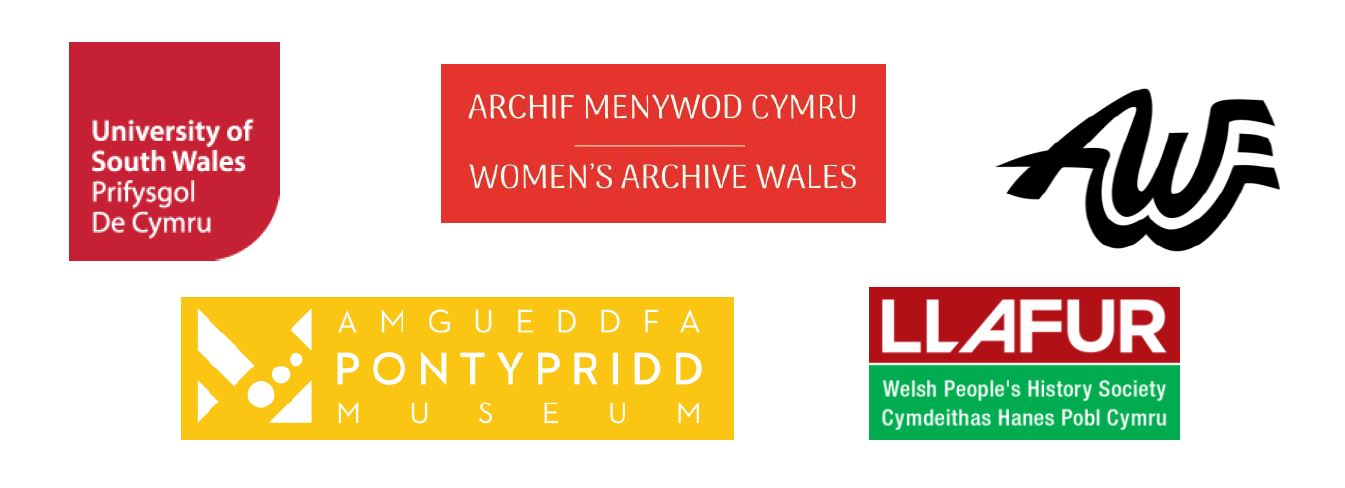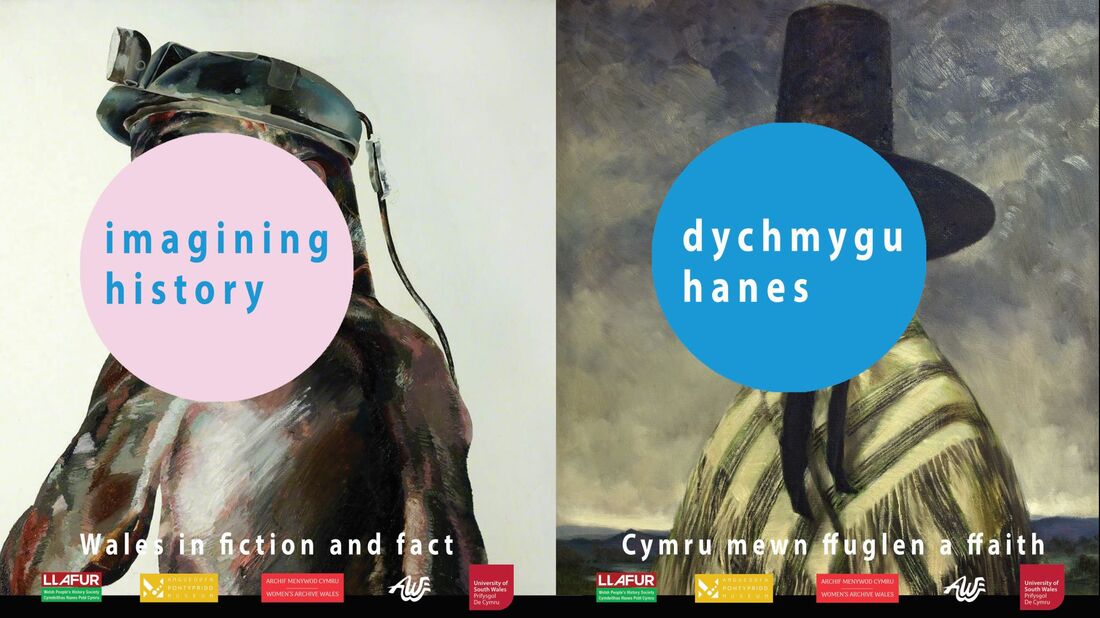Imagining History: Wales in fiction and fact / Dychmygu Hanes: Cymru mewn ffuglen a ffaith
Conference 12-13 November 2021
Online
(hosted online by the University of South Wales)
with an accompanying exhibition at Oriel y Bont, University of South Wales
Online
(hosted online by the University of South Wales)
with an accompanying exhibition at Oriel y Bont, University of South Wales
Imagined histories in the form of historical fiction, films or television programmes are often at the heart of how we think about our national and personal identities. Historical narratives based on ‘fact’ have always shaped our thinking about our nation, our communities and ourselves but they are often partial, fragmentary or distorted by particular vested interests. Historical fictions can allow us to re-imagine those narratives, filling the gaps and silences in recorded history. They can help us to imagine alternative histories as well as new futures.
This conference will explore the ways in which such fictions exist in a complex and sometimes contentious tension with mainstream historiographies.
This conference will explore the ways in which such fictions exist in a complex and sometimes contentious tension with mainstream historiographies.
Keynote Panels
- Y Castell Siwgr: Wales and transatlantic slavery – Angharad Tomos’s novel Y Castell Siwgr tells the story of the transatlantic links between Penrhyn castle and the plantations of Jamaica. To discuss the novel and explore the wider issue of slavery and its connections to Wales, Angharad is joined by Professor Chris Evans (University of South Wales), Audrey West and Marian Gwyn (chair, Race Council Cymru). Also includes a reading from the novel by Mirain Iwerydd.
- The Welsh in Ukraine: Fact and Fiction - the story of Merthyr-born John Hughes and the city he founded in Ukraine inspired both the three-part television history series Hughesovka and the New Russia and Catrin Collier’s trilogy, The Tsar's Dragons. Dr James Phillips (Llafur) talks to novelist Catrin Collier and Colin Thomas, the director of the television series.
- Raymond Williams Panel: Turning History into Fiction – the influential work of theorist and historical novelist Raymond Williams, author of The People of the Black Mountains, will be discussed by historian and writer Rhian E. Jones, Williams’s biographer, the historian and novelist Professor Dai Smith, and Professor Daniel Williams (Swansea University). Chaired by Professor Diana Wallace (University of South Wales).
|
UPDATE: Due to concerns about the upcoming changes in Covid restrictions this event will no longer take place in person. It will now take place online. If you have booked for the main conference, a link for this event will be sent to you via email so there is no need to book for the event separately. |
Interactive Creative Writing Workshops
In these interactive workshops, Creative Writing specialist Barrie Llewelyn will demonstrate some of the strategies that prose writers use to create characters and settings which capture a reader’s imagination. Participants who are interested in either writing historical fiction or teaching creative writing will have the opportunity to read examples, discuss tactics and create scenes of their own. These workshops must be pre-booked by adding them to your Eventbrite booking.
Organisers and Sponsors
Conference Organisers: University of South Wales, Association of Welsh Writing in English, Llafur, Archif Menywod Cymru/Women’s Archive Wales, and Pontypridd Museum.
Conference Organisers: University of South Wales, Association of Welsh Writing in English, Llafur, Archif Menywod Cymru/Women’s Archive Wales, and Pontypridd Museum.
Please book via Eventbrite: https://www.eventbrite.co.uk/e/198121997227
|
See the draft programme here:
|
| ||||||
For more information contact Professor Diana Wallace: [email protected] and/or Dr James Philips: [email protected]
Exhibition: Imagining History: History in Fiction and Fact/ Dychmygu Hanes: Cymru mewn ffuglen a ffaith at Oriel y Bont, Treforest Campus, University of South Wales
Open each weekday from Monday 1 November to Friday 17 December 2021.
The opening event is on Friday 12 November 6.30 – 8.30. Places are limited to comply with Covid safety regulations - please book via the Eventbrite link if you wish to attend.
The paintings, installations, photographs, sculptures, stories, and films on display, chosen from the USW Artworks Museum Collection, as well as works on loan from other collections, artists, or writers, are all to a greater or lesser degree unreliable. They reveal the ‘fictioning’ process we employ either to reflect or reset national and personal identities in the attempt to have our histories told and retold.
The exhibition includes work by Susan Adams, Iwan Bala, Judith Beecher, Elizabeth Bridge, Jack Crabtree, Morag Colquhoun, Ivor Davies, Ken Elias, Geraint Evans, Tom Goddard, Rachel Jones, Naomi Leake, Kate Milsom, Paul Reas, Andre Stitt, Daniel Trevidy, Dawn Woolley and others. For more information, see Oriel y Bont’s website.
The opening event is on Friday 12 November 6.30 – 8.30. Places are limited to comply with Covid safety regulations - please book via the Eventbrite link if you wish to attend.
The paintings, installations, photographs, sculptures, stories, and films on display, chosen from the USW Artworks Museum Collection, as well as works on loan from other collections, artists, or writers, are all to a greater or lesser degree unreliable. They reveal the ‘fictioning’ process we employ either to reflect or reset national and personal identities in the attempt to have our histories told and retold.
The exhibition includes work by Susan Adams, Iwan Bala, Judith Beecher, Elizabeth Bridge, Jack Crabtree, Morag Colquhoun, Ivor Davies, Ken Elias, Geraint Evans, Tom Goddard, Rachel Jones, Naomi Leake, Kate Milsom, Paul Reas, Andre Stitt, Daniel Trevidy, Dawn Woolley and others. For more information, see Oriel y Bont’s website.
Call for Papers - now closed
Imagined histories in the form of historical fiction, films or television programmes are often at the heart of how we think about our national and personal identities.* Historical narratives based on ‘fact’ have always shaped our thinking about our nation, our communities and ourselves but they are often partial, fragmentary or distorted by particular vested interests. Historical fictions can allow us to re-imagine those narratives, filling the gaps and silences in recorded history. They can help us to imagine alternative histories as well as new futures.
Writers such as Raymond Williams, Elaine Morgan, Angharad Price, Catrin Collier, R Cyril Hughes, Owen Sheers, Hilda Vaughan, Christopher Meredith, William Owen Roberts, Gwyn Thomas, Stevie Davies, Gwynn ap Gwilym, Bruce Chatwin, Margiad Evans, Marion Eames, Jerry Hunter, Siân James and T Llew Jones have given us fictions about the past which have been influential and, often, hugely popular. Such fictions exist in a complex and sometimes contentious tension with mainstream historiography.
The conference organisers invite contributions on any topic relating to imagining the histories of Wales. Contributions are encouraged from across disciplines, historical periods, and methodological approaches. Topics might include, but are by no means limited to:
Writers such as Raymond Williams, Elaine Morgan, Angharad Price, Catrin Collier, R Cyril Hughes, Owen Sheers, Hilda Vaughan, Christopher Meredith, William Owen Roberts, Gwyn Thomas, Stevie Davies, Gwynn ap Gwilym, Bruce Chatwin, Margiad Evans, Marion Eames, Jerry Hunter, Siân James and T Llew Jones have given us fictions about the past which have been influential and, often, hugely popular. Such fictions exist in a complex and sometimes contentious tension with mainstream historiography.
The conference organisers invite contributions on any topic relating to imagining the histories of Wales. Contributions are encouraged from across disciplines, historical periods, and methodological approaches. Topics might include, but are by no means limited to:
- historical fiction and the ‘imagined nation’
- local/global histories
- race/gender/class and imagined histories
- imagining alternative histories
- historical film/television
- preserving the past
- museums/archives and historical fiction/film
- language and imagined histories
* For the purposes of the conference we suggest as a starting point a definition of ‘historical fiction’ as a text (eg novel/film/television programme) which is set well before the time of production, usually at least 50 or 60 years before, or before the birth of the author.
It is our intention that the conference will not be confined to an academic audience and we encourage contributors to think in terms of talks that reach out to a wider audience. Papers in English and Welsh are welcome. Proposals for panels of three twenty-minute papers and for interdisciplinary panels are also welcomed.
Due to the pandemic we are exploring various ways of delivering the conference. This may be a traditional non-virtual conference; a hybrid conference delivered partially in person / virtually; or a virtual conference.
Organisers: University of South Wales, Association of Welsh Writing in English, LLafur, Archif Menywod Cymru/Women’s Archive Wales, and Pontypridd Museum.
Due to the pandemic we are exploring various ways of delivering the conference. This may be a traditional non-virtual conference; a hybrid conference delivered partially in person / virtually; or a virtual conference.
Organisers: University of South Wales, Association of Welsh Writing in English, LLafur, Archif Menywod Cymru/Women’s Archive Wales, and Pontypridd Museum.



